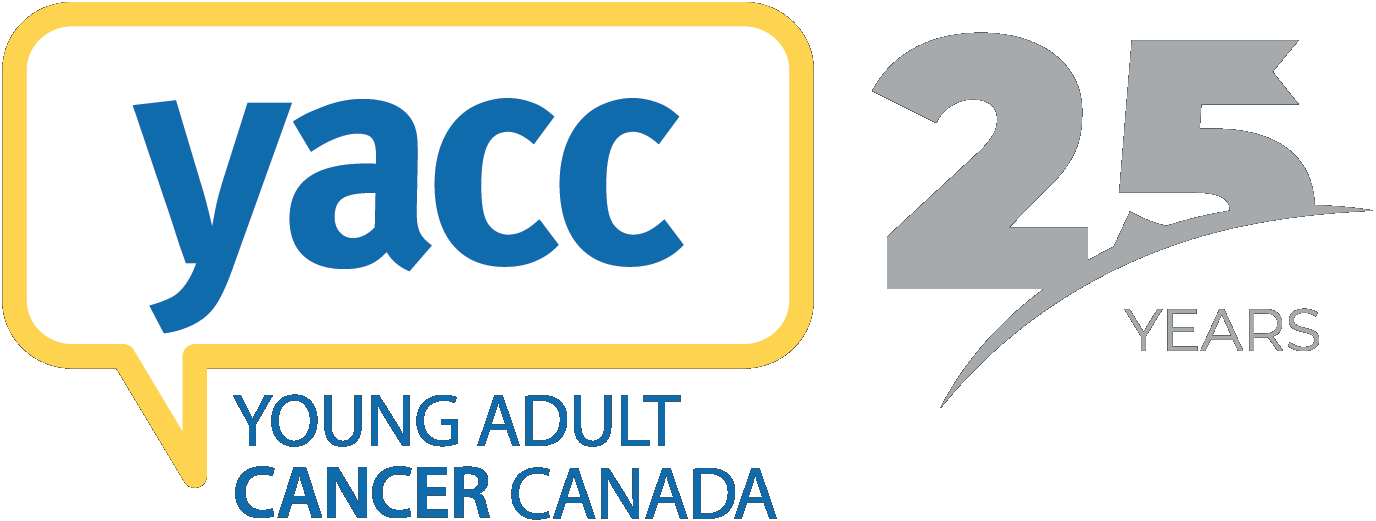By Karine Chalifour, YACC program director
STIGMA: A mark of disgrace associated with a particular circumstance, quality, or person: “the stigma of mental disorder”. Synonyms: brand – stain – taint.
That’s harsh! Reading that definition made me angry and sad knowing that many young adults in our community have been stigmatized in relation to their cancer diagnosis and all the shit that comes with it (pardon my French).
I believe stigma and fear are roommates. They live together, cook together, go to the movies together, they feed off of each other. It’s a totally co-dependent and unhealthy relationship, if you ask me! We stigmatize things we are afraid of, or that we don’t understand. Sadly, acting out of fear often means not thinking about the impact our actions can have on others. Like a defense mechanism, your friends and family members may say things hoping it will make those fears go away, but — guess what — it doesn’t work and can be hurtful.
I know cancer patients and survivors of all ages are being stigmatized, but young adults get the bulk of it. You may have heard some of these:
- “Cancer in your 20s or 30s? It’s not possible; you are too young!”
- “I’m sure it’s in your head.”
- “You look fine.”
- “You must be under too much stress.”
- “I’m sure you’re worrying about nothing; relax.”
Those are only a few of the comments that take place in the horrible waiting period young adults go through, but the stigma goes on even after diagnosis with comments like “But you look so good,” “Great, treatment is over, so now you can go back to normal,” “Now that you are finished radiation, when are you going back to work?” “You are young, you will recover quickly, and it will all be like a bad dream!” (Can you believe the shit people say sometimes to reassure themselves?)
I don’t want this blog to be a long rant on how unfair, judgmental, and ignorant is it to have preconceptions about someone who is dealing with cancer, but I would hope anyone reading this could reflect on times they may have said something out of fear that was really stigmatizing the person in front of them.
Going through cancer changes a person, and from what I am learning from the young adults in our community, it can sometimes even change things for the better. I wish people could appreciate how courageous, difficult, and challenging it can be to put your dreams on hold for an undetermined period; how stressful it can be to realize you can’t perform at work the way you use to; how wise it is to decide to wait before returning to school or work because you need time to heal; and how important it is to indulge in the good things in life once in a while!
The young adults in our community are strong, resilient, and face things most people can’t even imagine, but they are human nonetheless. No matter how much you work on not sweating the small stuff, you are not immune to hurtful comments.
Think before you talk, and listen before you respond or let your thoughts run wild — that should help.
 Karine is a graduate of Université du Québec à Montréal in Social Work and Psychology. After working in a hospital setting for years, she had the opportunity to co-facilitate a young adult support group. It became clear that this is what she wanted to do. In 2007, she started volunteering for YACC as a facilitator at Retreats and Conferences before moving to St. John’s and becoming a full-time employee. She is now the program director and is in charge of planning and delivering events and she loves every minute of it! (Read more)
Karine is a graduate of Université du Québec à Montréal in Social Work and Psychology. After working in a hospital setting for years, she had the opportunity to co-facilitate a young adult support group. It became clear that this is what she wanted to do. In 2007, she started volunteering for YACC as a facilitator at Retreats and Conferences before moving to St. John’s and becoming a full-time employee. She is now the program director and is in charge of planning and delivering events and she loves every minute of it! (Read more)
—
Find more info!
Check out this video where Megan Tucker talks about cancer stigma from the survivor perspective.
September was all about getting back on track. Click here to read how Duncan Pike got back to the idea of grad school, and read Dr. Heather Palmer’s article on dealing with brain fog.







